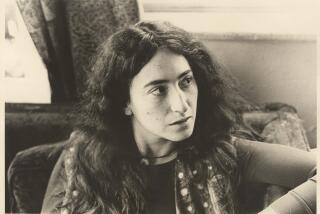Paul Fussell dies at 88; social historian and critic
For social historian and critic Paul Fussell, the most enduring moments of truth came as a 20-year-old platoon leader in France during World War II. German shrapnel tore up his back and thigh. The blood and guts of fellow soldiers were spewed on him. His staff sergeant died in his arms. He realized there was nothing romantic about war, only mud, cold, death, outrage and fear.
“The war,” Fussell told the Washington Post decades later, “is behind everything I do,” beginning with his book “The Great War and Modern Memory,” a classic 1975 critique of art and literature after World War I that showed how that conflict forever changed Western society and culture.
“Every war is ironic because every war is worse than expected,” Fussell wrote. “Every war constitutes an irony of situation because its means are so melodramatically disproportionate to its presumed ends.”
“The Great War and Modern Memory,” which won the National Book Award and the National Book Critics Circle Award, turned Fussell, a little-known expert on 18th century English literature, into an intellectual celebrity.
Fussell, 88, who died of natural causes Wednesday in Medford, Ore., “was a serviceman to the world in terms of understanding the horrors of war,” said his stepson, Cole Behringer.
Several of Fussell’s books dealt with war, including “Thank God for the Atom Bomb and Other Essays” (1988), “The Boys’ Crusade: The American Infantry in Northwestern Europe, 1944-1945” (2003), and his memoir, “Doing Battle: The Making of a Skeptic” (1996).
He also was an aggressively opinionated interpreter of societal maladies. In “Class: A Guide Through the American Status System” (1983), he expounded on class distinctions, which he viewed as essentially a matter of taste manifested in one’s choice of cars, houses, athletic obsessions and clothes. In his analysis, owning a Mercedes-Benz is a sign of upper-middle-class pretension, while a threadbare Oriental rug authenticates a higher status.
Some critics, including Alison Lurie in the New York Times, found the book witty; on the 25th anniversary of its publication in 2008, Sandra Tsing Loh wrote admiringly in the Atlantic of “this snide, martini-dry American classic.” But other critics were harsh, including James Fallows in the Washington Monthly, who called it “one long, mean-spirited sneer.”
In “BAD, or: The Dumbing of America” (1991), Fussell was unremittingly sarcastic, listing alphabetically many aspects of modern life that he found crass. “Bad,” he wrote, “is something like dog-do on the sidewalk, or a failing grade, or a case of scarlet fever — something no one ever said was good. BAD is different. It is something phony, clumsy, witless, untalented, vacant, or boring that many Americans can be persuaded is genuine, graceful, bright or fascinating.”
The son of a corporate lawyer, he was born Paul Fussell Jr. in Pasadena on March 22, 1924. After completing his military service — which earned him a Bronze Star and two Purple Hearts — he graduated from Pomona College in 1947 and moved to the East Coast “as a rebuke to California” and the stultifying upper-middle-class milieu he grew up in. He went on to Harvard, where he earned a master’s and a doctorate in English, and an academic career teaching at Connecticut College, Rutgers and the University of Pennsylvania.
He wrote conventional academic books — on poetry, Walt Whitman and Samuel Johnson — before creating what he later termed his “accidental masterpiece,” the study of World War I’s cultural impact.
“The Great War and Modern Memory” sought to demythologize combat by calling attention to such inconvenient truths as tactical errors, deserters and the smell of rotting corpses. He relied in particular on the accounts of “true testifiers” such as poet Robert Graves, who was severely wounded at the bloody Battle of the Somme.
“I think people who haven’t been through it are unfit to write military history because what happens in close combat is absolutely unknowable,” he told the London Guardian in 2004. “The temptation to run away, especially if you’re a leader of troops, almost never gets a look.... It’s a struggle about manhood as well as a struggle to keep from being hit from flying metal.”
Both a commercial and critical success, “The Great War” made “profound and far-reaching” claims for the meaning of war that “set the agenda for most of the criticism that has followed him,” Vincent B. Sherry wrote in “The Cambridge Companion to the Literature of the First World War.”
Fussell’s first marriage, to writer Betty Fussell, ended in divorce. (She wrote disparagingly of him in “My Kitchen Wars,” a 1999 memoir.) He is survived by his second wife, Harriette Behringer, whom he married in 1987; two children from his first marriage, Sam and Rosalind Fussell; four stepchildren, Cole, Rocklin, Marcy and Liese Behringer; a sister, Florence Fussell-Lind; 10 step-grandchildren; and six step-great-grandchildren.
More to Read
Start your day right
Sign up for Essential California for the L.A. Times biggest news, features and recommendations in your inbox six days a week.
You may occasionally receive promotional content from the Los Angeles Times.







